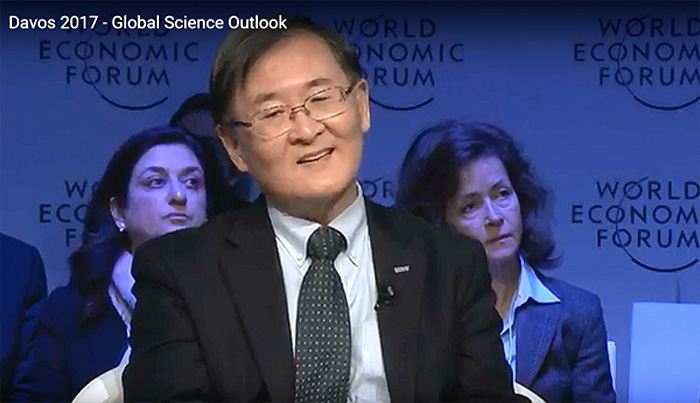people

President Sung-Mo Kang of KAIST participated in the World Economic Forum’s Annual Meeting January 17-20, 2017 in Davos, Switzerland.
On January 20, President Kang joined the Arena discussion on the outlook of global science in the year ahead with a group of distinguished scientists, including the Director of the US National Science Foundation, France A. Córdova, and the Editor-in-Chief of Nature, Philip Campbell.
Under Dr. Campbell’s moderation of the session, the panelists introduced their perspectives on 2017 and engaged in free discussions among themselves and with the audience.
President Kang began his talks on four major technological trends that have caught much of our attention in recent years, which he called “ICBM.” The “I” stands for the Internet of Things (IoT), “C” for cloud computing, “B” for brain, in other words, cognitive computer science such as artificial intelligence, and “M” for mobile technology that has been widely applied to unmanned ground vehicles and drones.
He noted the emergence of brain research as one of the most exciting fields in the coming years, and accordingly, we will learn more about its functions and develop promising results in treating brain-related diseases, i.e., a nanoscale memory chip being inserted into a patient suffering from dementia for targeted therapy.
President Kang also mentioned the role of higher education in the era of the Fourth Industrial Revolution, for example, how to foster scientists and engineers to responsibly meet with the challenges anticipated in today’s rapidly changing technological environments. He said that robots would replace many jobs, and it is important to come up with real solutions for such changes.
Lastly, President Kang stressed that the scientific community should continue its efforts to communicate with the public, accurately informing them of key scientific issues and offering opportunities to hold public discussions and debates that have greater influence over society. He presented a case of Korea’s latest outbreaks of Avian Influenza that resulted in destroying hundreds of thousands of infected chickens to prevent the spread of the disease, and highlighted the need for maintaining a strong communication channel between science and the public.
The full list of the participating panelists included Sung-Mo Steve Kang, President, KAIST; Marc N. Casper, President and Chief Executive Officer, Thermo Fisher Scientific, USA; France A. Córdova, Director of the National Science Foundation (NSF), USA; and Fabiola Gianotti, Director General of the European Organization for Nuclear Research (CERN), Geneva, Switzerland.
To watch the entire discussion, please go to https://www.youtube.com/watch?v=bF-joYnyYa0.
-
event 2025 KAIST Global Entrepreneurship Summer School Concludes Successfully in Silicon Valley
<A group photo taken at the 2025 GESS Special Lecture. Vice President So Young Kim from the International Office, VC Jay Eum from GFT Ventures, Professor Byung Chae Jin from the Impact MBA Program at the Business School, and Research Assistant Professor Sooa Lee from the Office of Global Initiative> The “2025 KAIST Global Entrepreneurship Summer School (2025 KAIST GESS),” organized by the Office of Global Initiative of the KAIST International Office (Vice President So
2025-07-01 -
research KAIST Develops AI to Easily Find Promising Materials That Capture Only CO₂
< Photo 1. (From left) Professor Jihan Kim, Ph.D. candidate Yunsung Lim and Dr. Hyunsoo Park of the Department of Chemical and Biomolecular Engineering > In order to help prevent the climate crisis, actively reducing already-emitted CO₂ is essential. Accordingly, direct air capture (DAC) — a technology that directly extracts only CO₂ from the air — is gaining attention. However, effectively capturing pure CO₂ is not easy due to water vapor (H₂O) present in the air. KAIST r
2025-06-29 -
people KAIST Invites World-Renowned Scholars, Elevating Global Competitiveness
< Photo 1. (From left) Professor John Rogers, Professor Gregg Rothermel, Dr. Sang H. Choi > KAIST announced on June 27th that it has appointed three world-renowned scholars, including Professor John A. Rogers of Northwestern University, USA, as Invited Distinguished Professors in key departments such as Materials Science and Engineering. Professor John A. Rogers (Northwestern University, USA) will be working with the Department of Materials Science and Engineering from July 2025 to J
2025-06-27 -
research New and Highly Efficient Recycling Technology to Turn Used Tires into Raw Materials for Rubber and Nylon
< (From left) Kyungmin Choi (MS-Ph.D. integrated course, Department of Chemistry), Dr. Beomsoon Park, Professor Soon Hyeok Hong, Dr. Kyoungil Cho > Approximately 1.5 billions of tires are discarded globally every year, and this is identified as one of the major causes of serious environmental pollution. The research team at the Department of Chemistry at KAIST has achieved a breakthrough by selectively converting waste tires into high-purity cyclic alkenes, valuable chemical buildin
2025-06-26 -
research Military Combatants Usher in an Era of Personalized Training with New Materials
< Photo 1. (From left) Professor Steve Park of Materials Science and Engineering, Kyusoon Pak, Ph.D. Candidate (Army Major) > Traditional military training often relies on standardized methods, which has limited the provision of optimized training tailored to individual combatants' characteristics or specific combat situations. To address this, our research team developed an e-textile platform, securing core technology that can reflect the unique traits of individual combatants and
2025-06-25